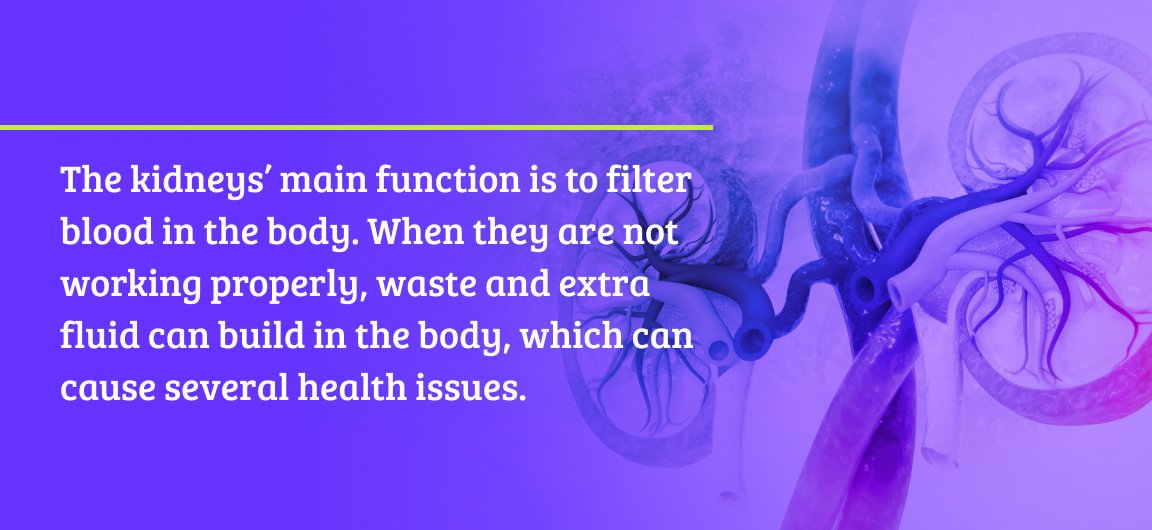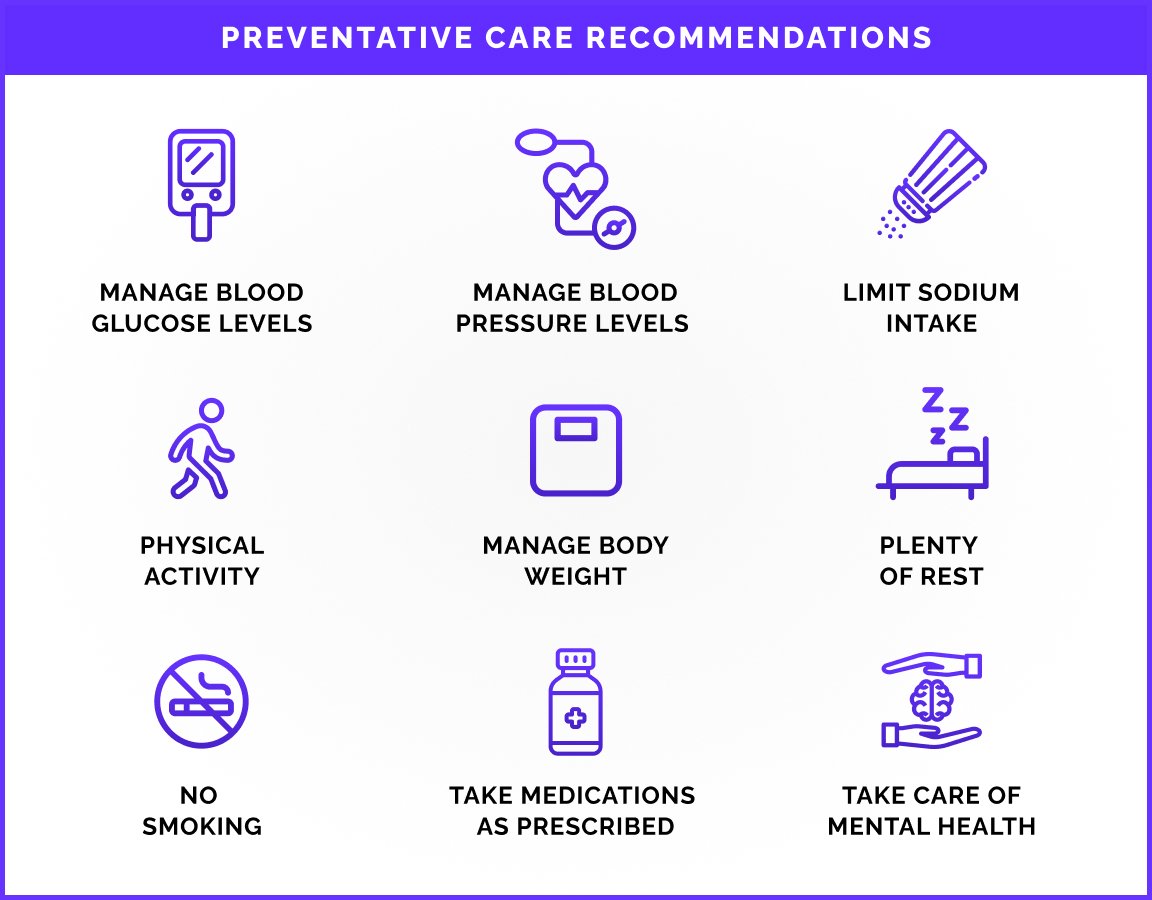Chronic Kidney Disease & the Importance of Preventative Care
1-in-3 People With Diabetes Will Develop CKD
The CDC estimates that 1-in-3 people with diabetes have kidney disease caused by diabetes. Sometimes referred to as diabetes-related kidney disease or DKD, it is essentially a form of chronic kidney disease (CKD). Yet many people with diabetes don’t realize that their kidneys have been damaged until after decades of deterioration, when they finally begin to experience low kidney function or even kidney failure. Often, by the time CKD is diagnosed it’s gotten to the point where the only treatment option is dialysis or a kidney transplant.
Chronic high blood glucose levels damage nephrons (tiny filters) and blood vessels in the kidneys leading to chronic kidney disease. Additionally, many people with diabetes also develop high blood pressure which also undermines kidney function.
Genetic predisposition also plays a role in developing CKD, as does the presence of certain blood biomarkers called Advanced Glycation End products or AGEs.
Kidneys filter waste and extra water out of the blood and into urine which is eliminated from the body. Kidneys also play a role in maintaining blood pressure and producing some of the hormones the body needs to stay healthy. When the kidneys don’t work correctly, waste products and extra fluid build up in the body. Ultimately, this can lead to high blood pressure, heart disease, stroke, and an early death.
CKD develops slowly, taking up to 20 years before showing any signs of kidney damage. For this reason, kidney disease is sometimes referred to as a hidden complication of diabetes. As kidney function decreases, a number of other symptoms may appear but go unrecognized as a sign of impared kidney function.
These symptoms include:
-
Anemia
-
Fluid retention, leading to swelling or shortness of breath
-
Weakened immune system
-
Loss of appetite or nausea
-
Weakened sexual response
-
Mental confusion, memory problems, or depression
-
Low calcium and high phosphorus levels in the blood, leading to bone disease and/or heart disease
-
High potassium levels in the blood, leading to irregular heartbeat
Knowing that CKD can be fatal and is difficult to diagnose, makes it all the more important for people with diabetes to manage their kidney health. Preventative care, in the form of health checks and preventative care strategies, can close this gap in knowledge and reduce the risk of developing CKD.

Given the chronic nature of diabetes and how difficult it is to track early signs of CKD, preventative care provides a means to maintain a person’s current kidney health.
Preventative medicine is a combination of public health policies and medical care practices aimed at avoiding and reducing the risk of developing illness or disease either in populations or for individuals. Whether at a population or personal level, preventative medicine provides strategies for maintaining a healthy productive life and reducing healthcare costs over the long term.
Many preventative care practices are familiar. They include regular check-ups, lab work and health checks, vaccinations, managing diet, and exercise. Preventative care practices can also include educational efforts like demonstrating how to do self-checks for breast or testicular cancer or discussing changes needed in the home to reduce the risk of falling.
Because the positive effects of preventative care are cumulative, they are most effective when started earlier rather than put off until later in the person’s life.
Preventative Care Health Checks Measure Current Kidney Health
The CDC has stated that preventative care “...interventions, combined with lifestyle changes, can substantially reduce the incidence of chronic disease and the disability and death associated with chronic disease.” This includes chronic illness like diabetes and the disability and death that can be caused by CKD.
The current Standards of Medical Care in Diabetes—2022 include comprehensive guidance on preventative care and health checks for diabetes care.
The preventative care recommendations in these standards include:
-
Actively managing blood glucose (BG) levels
-
Actively managing blood pressure (BP) levels
-
Limiting salt & sodium intake
-
Being physically active
-
Managing your bodyweight
-
Getting enough rest
-
Stop smoking
-
Taking medications as prescribed
-
Managing stress, anxiety, and depression
Preventative care health checks for kidney health focus on the A1C, eGFR (estimated glomerular filtration rate), and ACR (albumin-to-creatinine ratio) lab tests.
Blood is drawn for the A1C and eGFR. ACR is measured using a urine sample. Together, these periodic health checks provide a read on the person’s current state of health. The A1C results reflect the person’s level of glycemic control over the past 2-3 months. The eGFR and ACR report their current level of kidney function.
But these tests don’t give any indication of the person’s risk level for developing DKD or any detailed reading on whether the person’s kidney function has already been compromised. In fact, these checks may not show any significant change in kidney function until the person has already reached moderate loss (around 45%) of kidney function.

A Preventative Care Health Check That Reveals CKD Risk Level
Current preventative care practices for chronic kidney health for people with diabetes focus solely on the person’s present-day state of health. Often this means that by the time kidney health becomes a concern, physical damage to the kidneys has already happened making reversal of that damage and recovery of kidney function highly unlikely.
Certainly, a preventative care health check that identifies a person’s risk level for developing kidney problems long before any symptoms show up or lab tests measure significant loss in kidney function would be valuable.
With this kind of preventive health check, the person and their medical practitioner could take action sooner to engage in personalized care that maintained kidney health and reduced the risk of developing DKD.
NaviDKD® is just this kind of preventative care health check. Based on a measurement of certain blood biomarkers, known as AGEs, along with certain other risk factors, NaviDKD reports the person’s individual risk level for developing kidney complications from diabetes.
About Journey Biosciences
Journey Biosciences is on a mission to improve the lives of people with diabetes through proactive, personalized care. One in three people with diabetes faces the hidden threat of kidney disease. Our flagship solution, NaviDKD®, is an innovative blood test that identifies this risk years in advance, enabling personalized preventive care for better health outcomes. By empowering early action, we aim to significantly reduce the burden of diabetes-related kidney disease on patients and healthcare systems. Discover more at journeybio.life.
For media inquiries: media@journeybio.life



